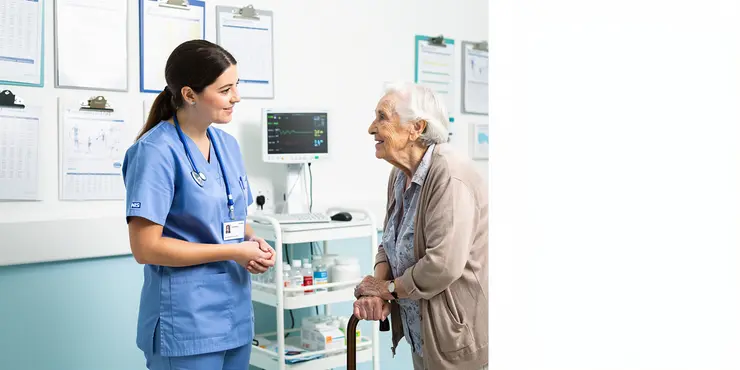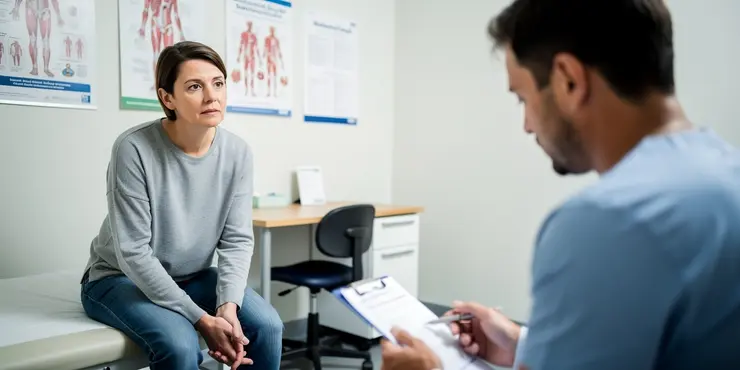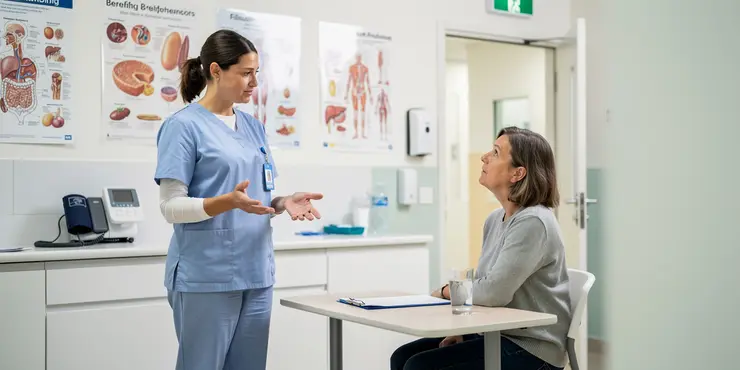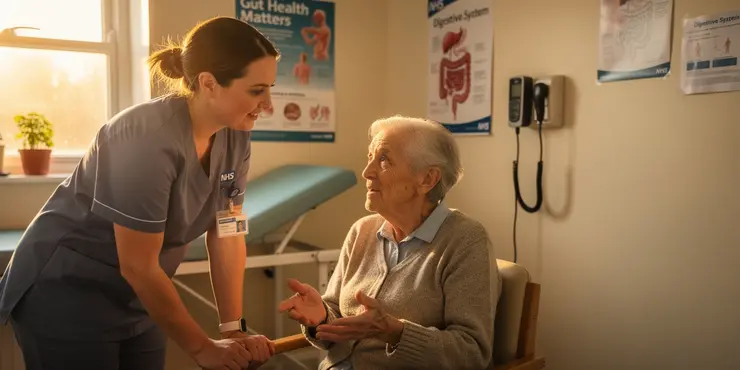Find Help
More Items From Ergsy search
Diverticular Disease - November 2021 Insights
Understanding Diverticular Disease
Diverticular disease encompasses two related conditions: diverticulosis and diverticulitis. Diverticulosis is the formation of small pouches (diverticula) in the lining of the intestine. It becomes diverticulitis when these pouches become inflamed or infected. This condition primarily affects the large intestine (colon).
Prevalence in the United Kingdom
In the UK, diverticular disease is a common condition, especially among older adults. Studies suggest that over 50% of people aged 60 and above may develop diverticulosis, although many remain asymptomatic. The incidence of diverticulitis, more severe and symptomatic, is also notable among this demographic.
Causes and Risk Factors
The exact cause of diverticular disease is not entirely understood. However, several factors may contribute, including a low-fibre diet, aging, obesity, and a sedentary lifestyle. The Western diet, which is often low in fibre, is particularly linked to higher rates of the disease.
Symptoms and Diagnosis
Diverticular disease symptoms can range from mild to severe. Common symptoms include abdominal pain, bloating, changes in bowel habits, and, in the case of diverticulitis, fever, and chills. Diagnosis is typically achieved through medical imaging such as a CT scan, alongside a clinical evaluation.
Treatment and Management
Treatment for diverticular disease varies depending on severity. For asymptomatic diverticulosis, a high-fibre diet is often recommended to prevent progression. In the case of diverticulitis, antibiotics and a clear-liquid diet may be prescribed. Severe cases might necessitate surgical intervention.
Prevention Strategies
Preventing diverticular disease involves adopting a healthy lifestyle. Ensuring an adequate intake of fibre through fruits, vegetables, and whole grains is crucial. Regular physical activity, maintaining a healthy weight, and avoiding smoking also play significant roles in prevention.
Conclusion
Diverticular disease is a significant health concern in the UK, particularly among older adults. Understanding its causes, symptoms, and treatment options is essential for managing and preventing this condition effectively. With appropriate dietary and lifestyle changes, individuals can reduce their risk and improve their overall digestive health.
Diverticular Disease - Simple Guide
What is Diverticular Disease?
Diverticular disease includes two problems: diverticulosis and diverticulitis. Diverticulosis is when small pouches form in the intestine. It becomes diverticulitis when these pouches get sore or infected. It mostly affects the large intestine (colon).
How Common is it in the UK?
In the UK, diverticular disease is common, especially in older people. More than half of people over 60 might get diverticulosis. Often, they do not have symptoms. Diverticulitis, which is more serious, is also common in older people.
What Causes It?
Doctors are not sure what causes diverticular disease. Eating less fibre, getting older, being overweight, and not moving enough might be reasons. Eating a Western diet, which has little fibre, is linked to more cases of the disease.
What are the Symptoms?
Symptoms can be mild or severe. Common symptoms are tummy pain, bloating, and changes in poo habits. If you have diverticulitis, you might also have a fever or chills. Doctors use a CT scan and check your health to find the disease.
How is it Treated?
Treatment depends on how bad it is. For diverticulosis without symptoms, eating lots of fibre can help. If you have diverticulitis, doctors might give you medicine and ask you to drink only clear fluids. Some people might need surgery if it is very bad.
How Can You Prevent It?
You can help prevent diverticular disease by living healthily. Eat lots of fibre, like fruits, vegetables, and whole grains. Exercise regularly, stay at a healthy weight, and do not smoke to help prevent the disease.
Conclusion
Diverticular disease is a big health issue in the UK for older adults. Knowing the causes, symptoms, and treatments is important to manage it. With the right food and lifestyle choices, you can lower your risk and keep your digestion healthy.
Frequently Asked Questions
What is diverticular disease?
Diverticular disease occurs when small bulges or pockets (diverticula) form in the lining of the intestine. It is common in people over the age of 40.
What causes diverticular disease?
The exact cause of diverticular disease is not known, but it is believed to be linked to a low-fibre diet, which leads to hard stools and increased pressure on the colon.
What are the symptoms of diverticular disease?
Symptoms can include abdominal pain, bloating, constipation, and diarrhoea. In some cases, people may experience rectal bleeding.
How is diverticular disease diagnosed?
Diagnosis is typically made through a combination of medical history, physical examination, and imaging tests such as a CT scan or colonoscopy.
Is diverticular disease the same as diverticulitis?
No, diverticular disease refers to the presence of diverticula. Diverticulitis occurs when these diverticula become inflamed or infected.
What treatments are available for diverticular disease?
Treatment may include a high-fibre diet, pain relief medication, and antibiotics if an infection is present. Severe cases might require surgery.
Can diverticular disease be prevented?
A diet high in fibre, regular exercise, and staying hydrated can help reduce the risk of developing diverticular disease.
What should I eat if I have diverticular disease?
A diet rich in fruits, vegetables, whole grains, and legumes is recommended. Avoiding nuts and seeds is no longer generally advised.
Are there complications associated with diverticular disease?
Yes, complications can include diverticulitis, abscesses, fistulas, bowel obstructions, and in rare cases, peritonitis.
How common is diverticular disease in the UK?
Diverticular disease is relatively common, particularly in older adults. About 5% of the UK population under 40, and 50% above 60, are affected.
Can diverticular disease lead to cancer?
Diverticular disease itself does not lead to cancer, but symptoms can sometimes be similar to those of colorectal cancer, so proper diagnosis is important.
Is surgery always required for diverticular disease?
Surgery is not always required and is typically considered for severe or recurrent cases that do not respond to medical treatment.
Can lifestyle changes improve diverticular disease?
Yes, increasing dietary fibre, drinking plenty of fluids, and regular physical activity can help manage the symptoms of diverticular disease.
Is diverticular disease hereditary?
There is evidence to suggest a genetic component, as diverticular disease can run in families, but lifestyle factors also play a significant role.
When should I seek medical attention for diverticular disease?
You should seek medical attention if you experience severe abdominal pain, fever, vomiting, rectal bleeding, or any significant changes in bowel habits.
What is diverticular disease?
Diverticular disease happens when small bulges, called diverticula, form in the wall of the gut. These bulges can become sore or swollen.
It's a condition that affects your digestion, which is how your body uses food.
If you're having trouble understanding, you might like to use tools like text-to-speech or reading apps to help. It's always okay to ask for help from someone you trust.
Diverticular disease is when small bumps, called diverticula, form in the walls of the intestine. This happens a lot in people older than 40.
What makes diverticular disease happen?
Diverticular disease happens when small bulges or pockets form in the walls of the large intestine. These are called diverticula. They can get inflamed and cause pain.
Causes:
- Eating a low-fiber diet.
- Not drinking enough water.
- Being overweight.
- Not exercising enough.
Helpful Tips:
- Eat more fruits and vegetables.
- Drink plenty of water every day.
- Stay active with regular exercise.
- Talk to a doctor if you have tummy pain.
Using a dictionary or asking someone to help can make reading easier.
The exact cause of diverticular disease is not known, but doctors think it might be because of eating foods low in fiber. This can make it hard to poo and puts more pressure on the bowel.
What are the signs of diverticular disease?
Diverticular disease can make your tummy hurt. Here are some signs:
- Your tummy might hurt, especially on the left side.
- You might feel bloated or full.
- You could have changes in your poo, like constipation or diarrhoea.
- Sometimes you might feel sick or vomit.
If you think you have this, it's a good idea to talk to a doctor.
Tools to help:
- Ask someone you trust to help read this.
- Use pictures or drawings to understand better.
Symptoms can be tummy pain, a swollen tummy, trouble going poo, or loose poo. Sometimes, people may bleed from their bottom.
How does a doctor find out if you have diverticular disease?
Doctors use tests to see if you have diverticular disease. They might ask you to do a special x-ray or a camera test called a colonoscopy. This helps them look inside your tummy.
If you think you have diverticular disease, ask a doctor. They can help you find out what to do next.
Doctors find out what is wrong by asking about the person's health before, looking at their body, and using special pictures like a CT scan or colonoscopy.
Are diverticular disease and diverticulitis the same?
No, they are not the same, but they are related.
Diverticular disease is when small bulges called diverticula form in the bowel wall. Many people have these without any problems.
Diverticulitis is when these small bulges (diverticula) get swollen and sore. This can be painful.
To understand better, use drawings or talk with your doctor. They can help explain it more simply.
Using tools like diagrams or simple charts can also be helpful.
No, diverticular disease means little bulges, called diverticula, are in the gut. Diverticulitis happens when these bulges get sore or infected.
What can help if you have diverticular disease?
Here are some things that might help if you have diverticular disease:
- Eat More Fiber: Try to eat foods with fiber like fruits, vegetables, and whole grains.
- Drink Water: Make sure to drink plenty of water every day.
- Meds from the Doctor: A doctor might give you medicine to help with pain or infection.
- Rest: Get enough rest and take it easy if you feel tired.
- Visit Your Doctor: Keep in touch with your doctor for advice and check-ups.
If you find reading hard, you can ask someone to read with you or use an app that reads the words out loud. Showing pictures to describe the information or using a calendar to track symptoms can also be helpful.
If you are sick, you might need to eat foods with lots of fiber. This can help you feel better. You might also take medicine if you are in pain. If you have an infection, you might need special medicine called antibiotics. Sometimes, if it is very serious, you might need an operation.
Can we stop diverticular disease from happening?
Some things can help keep your tummy healthy and might stop diverticular disease:
- Eat lots of fruits and vegetables. They have good stuff called fiber that helps.
- Drink plenty of water every day.
- Exercise regularly, like walking or playing games.
- Go to the bathroom when you need to, don't hold it in.
If you need more help, you can talk to a doctor or use tools like picture cards and simple apps that explain health.
Eating foods with lots of fibre, moving your body, and drinking plenty of water can help keep your tummy healthy and stop problems.
What can I eat if I have diverticular disease?
If you have diverticular disease, it is important to eat foods that are good for your tummy. Here are some tips:
- Eat lots of fruits and vegetables. They help keep your tummy healthy.
- Try to eat whole grains like brown bread and oatmeal. These are good for your belly.
- Avoid nuts and seeds if your tummy doesn't like them.
- Drink plenty of water. It helps your tummy work well.
Tools and tips that can help you:
- Use a food diary. Write down what you eat and how it makes you feel.
- Ask a grown-up to help you make a meal plan.
- Talk to your doctor if you have any questions.
It is good to eat lots of fruits, veggies, whole grains, and beans. You do not have to avoid nuts and seeds anymore.
Can diverticular disease cause problems?
Sometimes, diverticular disease can cause issues. Here are some things to watch out for:
- Pain in the tummy
- Infection
- Bleeding
- Blockages
If you are unsure or worried, it is important to talk to a doctor.
Using pictures or videos can help make things clearer. You can also ask someone you trust to help you understand.
Yes, problems can happen. These problems might be:
- Diverticulitis: This means swelling in the little pouches of the intestine.
- Abscesses: These are spots filled with pus, like infected bumps.
- Fistulas: These are strange tunnels that can form in the body.
- Bowel obstructions: This means something is blocking the intestines.
- Peritonitis: This is a bad infection inside the tummy, but it doesn't happen often.
If you find this hard to read, ask someone to help. You can also use tools that read the text out loud for you.
How many people in the UK have diverticular disease?
Many people in the UK get diverticular disease as they get older. This means it is common.
For more help, you can:
- Ask a doctor or nurse.
- Look at pictures or videos about diverticular disease.
- Use apps that help with reading.
Diverticular disease is a sickness that many people get, especially older people. In the UK, about 5 out of 100 people under 40 years old have it. For people over 60, about 50 out of 100 have it.
Can diverticular disease cause cancer?
Diverticular disease is when small bulges or pockets form in the wall of the large bowel (intestine).
This disease itself does not cause cancer.
If you are worried about diverticular disease or cancer, it's good to talk to a doctor.
You can ask someone to go with you to the doctor to help you understand.
Using pictures or writing notes can also help you learn more.
Diverticular disease does not cause cancer. But the signs of diverticular disease can look a lot like the signs of bowel cancer. It is important to see a doctor to make sure what it is.
Do you always need surgery for diverticular disease?
Diverticular disease means there are small bulges in your large intestine.
You may not always need surgery to feel better.
Doctors can help with other treatments like:
- Healthy food
- Medicines
Talk to your doctor about what is best for you.
If you find it hard to understand, ask a friend or family member to help you.
Not everyone needs surgery. We only think about it if problems are really bad or keep coming back, and if medicine doesn't help.
Can changes in the way you live help with diverticular disease?
Yes, making changes in your everyday life can help with diverticular disease.
Here are some simple things you can do:
- Eat more fiber: Fiber is great for your tummy. Try eating fruits, vegetables, and whole grains.
- Drink plenty of water: Water helps your digestion. Make sure to drink enough each day.
- Exercise regularly: Moving around and being active can help your belly feel better.
- Listen to your body: Go to the bathroom when you need to. Don’t hold it in.
- Talk to your doctor: If you have questions or it feels hard to manage, ask a doctor for help.
Using tools like picture charts or setting reminders can also help you remember these tips.
Yes, eating more foods with fibre, drinking lots of water, and moving your body every day can help with diverticular disease.
Can you get diverticular disease from your family?
Diverticular disease is when small bulges or pockets form in the wall of the gut. Some people might wonder if you can get this illness from your family. Doctors think it can run in families, but not always. Eating healthy food, like fruits and vegetables, drinking lots of water, and exercising can help you stay well. Using pictures or talking with someone can help you understand more about this illness.
Diverticular disease might be passed down in families, which means it could be in your genes. But things like how you live also matter a lot.
When should I go to the doctor for diverticular disease?
If your tummy hurts a lot, you feel very hot, throw up, see blood when you go to the toilet, or if your toilet habits change a lot, you should go to the doctor.
Useful Links
This website offers general information and is not a substitute for professional advice.
Always seek guidance from qualified professionals.
If you have any medical concerns or need urgent help, contact a healthcare professional or emergency services immediately.
Some of this content was generated with AI assistance. We’ve done our best to keep it accurate, helpful, and human-friendly.
- Ergsy carfully checks the information in the videos we provide here.
- Videos shown by Youtube after a video has completed, have NOT been reviewed by ERGSY.
- To view, click the arrow in centre of video.
- Most of the videos you find here will have subtitles and/or closed captions available.
- You may need to turn these on, and choose your preferred language.
- Go to the video you'd like to watch.
- If closed captions (CC) are available, settings will be visible on the bottom right of the video player.
- To turn on Captions, click settings .
- To turn off Captions, click settings again.





